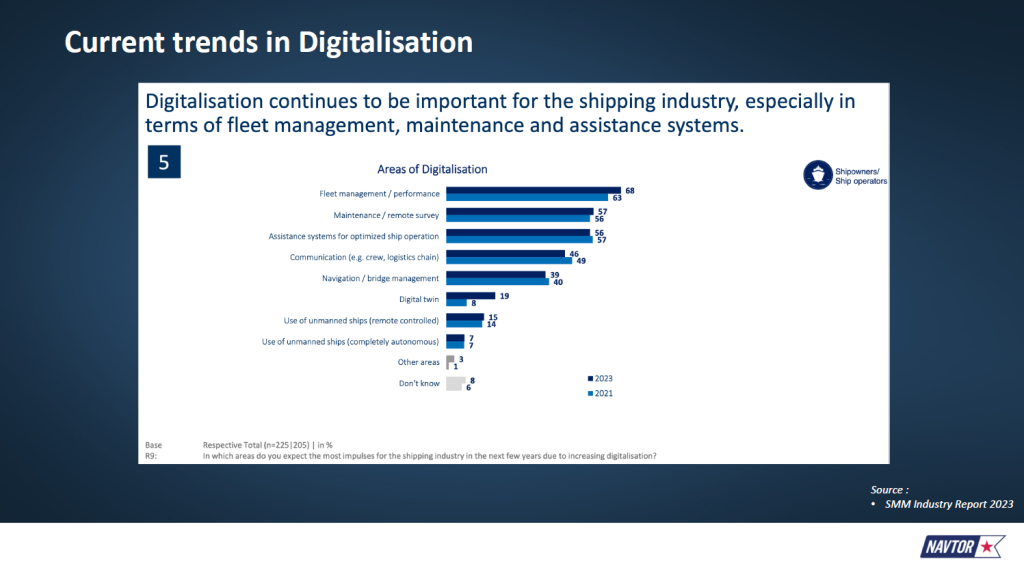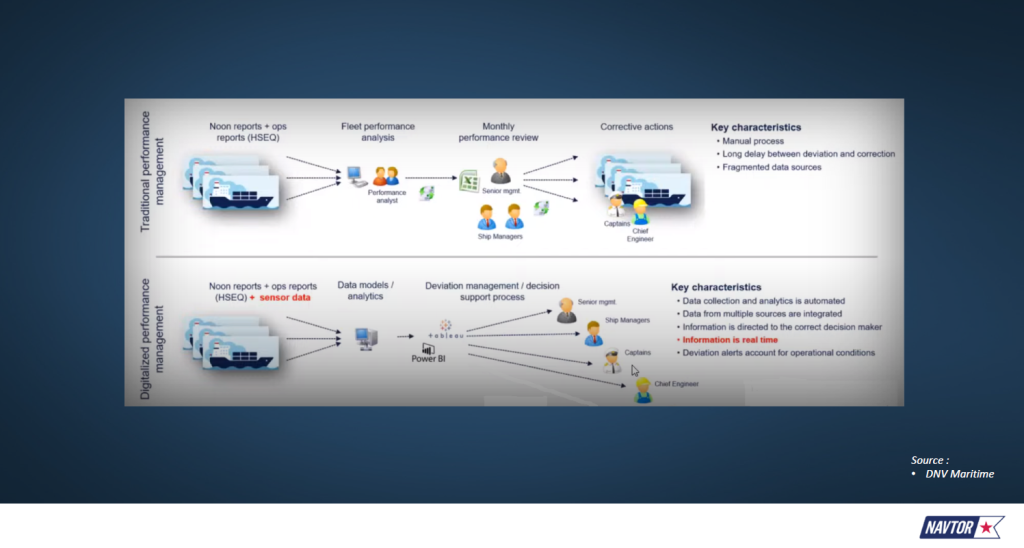During the 2023 SAFETY4SEA Singapore Forum, Abhishek Iyer, Customer Success Manager, Navtor, highlighted that the maritime industry’s digital journey has seen positive impacts, including improved situational awareness and reduced errors.
For over a century, the shipping industry has been relying on manual operations and has a persistent resistance to change, with a staggering 80% of global ports still clinging to conventional methods like spreadsheets, whiteboards, and email correspondence. This resistance, akin to the uncertainties faced by explorers like Ernest Shackleton in the past, echoes a similar sentiment in the digital era of 2023.
Impact of poor digitalisation
- 40% vessels have delays in route planning due to insufficient real-time data
- 25% decrease in operational efficiency due to incomprehensive data analytics
- 65% maritime incidents due to lack of real-time navigation insights
- 20% rise in safety-related violations due to insufficient data integration
In the year 2021, the global data influx reached a staggering 79 zettabytes, and projections indicate a doubling of this volume by 2025. This exponential growth brings concerns about effectively leveraging complex data, necessitating a shift in mindset and the adoption of advanced technology tools.
The shipping industry faces a notable obstacle in fostering collaboration. The reluctance to share data hampers successful technology implementations. Approximately 45% of maritime companies have cited internal resistance to change, while 60% of maritime industry stakeholders have expressed concerns regarding data security issues.

Additionally, there is the issue of fragmentation and silos, with more than 55% of maritime organisations reporting difficulties in data integration and collaboration. A striking example is the TradeLens joint venture between Maersk and IBM, which folded due to a lack of industry buy-in, underscoring the dangers of fragmentation.
The era of data-driven operations has arrived, and the sharing of data can amplify positive effects within the industry. Intelligent software solutions stand ready to analyse complex data, facilitating informed decision-making and steering the industry toward a more efficient and effective future. These solutions facilitate a cultural shift toward data-driven decision-making.
The benefits of digital integration
However more than half of maritime companies face challenges related to the lack of integrated digital tools. On the other hand, companies embracing data-driven decision-making practices in the maritime sector are reaping substantial benefits. On average, these organisations report a remarkable 15% reduction in operational costs, coupled with a commendable 12% increase in overall efficiency.

Moreover, those leveraging analytics for decision support have seen a noteworthy 20% decrease in maritime accidents and an impressive 25% reduction in fuel consumption. The integration of data-driven strategies further translates into a 30% improvement in vessel scheduling and a 25% decrease in turnaround time.
Beyond operational enhancements, the adoption of data-driven decision support systems in the maritime industry holds promise in environmental sustainability, potentially leading to a significant 15% reduction in greenhouse gas emissions.
Intelligent software-based solutions play a pivotal role in unraveling the complexities of vast datasets, paving the way for a significant cultural shift towards data-driven decision-making. The decision-making involves a structured process comprising five key steps:
- identifying the goal
- gathering relevant information
- making an assessment
- reaching a decision
- evaluating the decision.
Improving efficiency with digital solutions
While one might question the practicality of meticulously following these steps each time, the advent of database decision-making addresses this concern. These software solutions seamlessly augment every stage of the decision-making process, efficiently reducing both the time and capital associated with making informed choices.
Today’s sophisticated software solutions provide deep insights into various facets of an organisation, utilising high-volume, quality data to empower users in making rapid, accountable, and targeted decisions aligned with their business objectives.
This transformative approach not only enhances decision-making efficiency but also aligns organisations with the evolving landscape of data-driven strategies.
The views presented are only those of the author and do not necessarily reflect those of SAFETY4SEA and are for information sharing and discussion purposes only.
Above article is a transcript from Abhishek Iyer’s presentation during the 2023 SAFETY4SEA Singapore Forum with minor edits for clarification purposes.
Explore more by watching his video presentation here below






























































